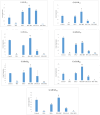In a rodent model of autism, probiotics decrease gut leakiness in relation to gene expression of GABA receptors: Emphasize how crucial the gut-brain axis
- PMID: 39380963
- PMCID: PMC11459612
- DOI: 10.1515/tnsci-2022-0354
In a rodent model of autism, probiotics decrease gut leakiness in relation to gene expression of GABA receptors: Emphasize how crucial the gut-brain axis
Abstract
Objective: Rodent models may help investigations on the possible link between autism spectrum disorder and increased permeability of the gastrointestinal (GI) tract since autistic patients frequently manifested GI troubles as comorbidities.
Methods: Forty young male western Albino rats, weighing approximately 60-70 g and aged 3-4 weeks, were used. In each of the six experimental groups, eight animals were treated as follows. The mice in the control group (I) received phosphate-buffered saline orally. For 3 days, the animals in the propionic acid (PPA)-treated groups (II and III) were given an oral neurotoxic dose of PPA (250 mg/kg body weight each day). Group II was euthanized after 3 days; however, Group III was left alive to be euthanized alongside the other groups. The animals were kept at 22 ± 1°C and allowed to access water and normal food as needed. Identical dosages of PPA were given to the rats in the three treatment groups (IV, V, and VI), and for 3 weeks, they were given the following treatments: 0.2 g/kg body weight of pure Bifidobacterium infantis, a probiotic mixture of PROTEXIN®, Somerset, UK and pure Lactobacillus bulgaricus, respectively. The six groups underwent measurements of serum zonulin and occludin as variables associated with leaky gut, glutathione, malondialdehyde, and catalase as oxidative stress-related variables, with gamma-aminobutyric acid (GABA) receptor gene expression.
Results: This study demonstrated the potential effects of pure or mixed probiotics in lowering zonulin and occludin as markers of increased intestinal permeability, enhancing GABA receptor expression, and reducing oxidative stress as neurotoxic effects of PPA.
Conclusions: This study demonstrates that various probiotics protect gut barrier function and could be used to alleviate increased intestinal permeability caused by oxidative stress and impaired GABA signaling as a result of PPA neurotoxicity, addressing the clinical implications of probiotic supplements.
Keywords: GABA receptors; autism spectrum disorders; occludin; oxidative stress; probiotics; propionic acid; zonulin.
© 2024 the author(s), published by De Gruyter.
Conflict of interest statement
Conflict of interest: The authors state no conflict of interest.
Figures


References
LinkOut - more resources
Full Text Sources
